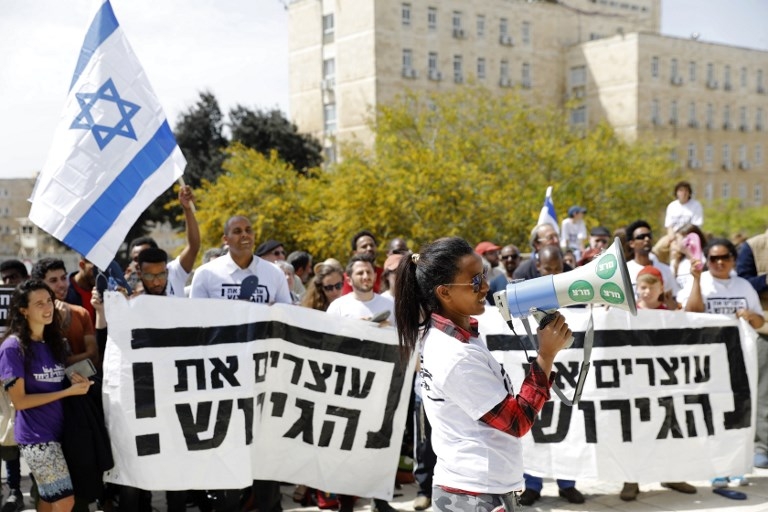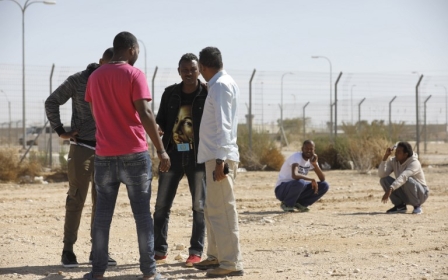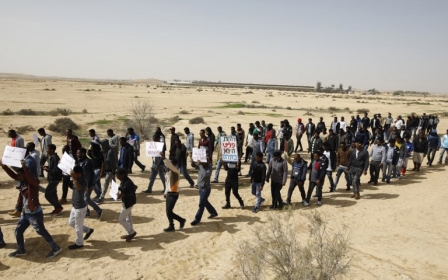Netanyahu cancels UN migrant deal day after its announcement

Benjamin Netanyahu on Tuesday said he is cancelling an agreement with the UN refugee agency UNHCR to relocate thousands of African migrants to Western countries, an embarrassing U-turn after its announcement only a day earlier.
The deal was opposed by right-wingers and residents of south Tel Aviv, as it would give thousands of migrants the right to stay in the country, and two of the Western countries named - Italy and Germany - said they did not know of any such agreement.
After I again weighed the advantages and disadvantages, I decided to cancel the deal
- Benjamin Netanyahu
The Israeli prime minister declared the agreement dead at a meeting on Tuesday with representatives of residents of south Tel Aviv, an impoverished area that has attracted the largest migrant community and where many of its inhabitants want the Africans out.
"I have listened carefully to the many comments on the agreement. As a result, and after I again weighed the advantages and disadvantages, I decided to cancel the deal," a statement from the prime minister's office quoted Netanyahu as saying at the session.
"Despite legal restraints and international difficulties that are piling up, we will continue to act with determination to explore all of the options at our disposal to remove the infiltrators," Netanyahu added.
Netanyahu U-turn
Netanyahu himself announced the agreement in a televised address on Monday afternoon. Hours later, he changed course and put the deal on hold until a further review, just to cancel it on Tuesday.
The agreement was designed to end the possibility of forced deportations of thousands of migrants to Rwanda under a controversial plan put forward by Netanyahu in January.
According to the agreement with the UN refugee agency that Netanyahu outlined on Monday, about 16,250 African migrants, most of them from Eritrea and Sudan, would have been relocated to Western nations.
In return, Israel would grant temporary residency to one migrant for each one resettled elsewhere.
The UN urged Netanyahu to "reconsider" a decision to scrap an agreement on resettling African migrants.
"UNHCR notes the announcement of Israeli Prime Minister Netanyahu that he has cancelled the Israel-UNHCR agreement of April 2nd on solutions for Eritreans and Sudanese living in Israel," a spokesman for the UN agency, William Spindler, told AFP in an email.
"We continue to believe in the need for a win-win agreement that can benefit Israel, the international community and people needing asylum and we hope that Israel will reconsider its decision soon," Spindler added.
Netanyahu's right-wing government has been under pressure from its nationalist voter base to expel the migrants.
It had been moving ahead with plans to deport many of them to Rwanda when Israel's Supreme Court intervened and froze such deportations in March.
Naftali Bennett, Israel's minister of education, tweeted congratulating Netanyahu for his "wise decision" to cancel the deal regarding absorbing "infiltrators", an Israeli term used to refer to African migrants inside Israel.
"Avoided crying for generations. Now we must act to remove the illegal infiltrators," Bennett tweeted.
Translation: I congratulate the prime minister on his wise decision to cancel the deal for absorbing infiltrators. Avoided crying for generations. Now we must act to remove the illegal infiltrators.
A group of residents of southern Tel Aviv, where many of the migrants have settled, also denounced the new plan in a statement, calling it "a shame for the state of Israel".
Netanyahu met on Tuesday some Israeli residents and city council representatives of south Tel Aviv.
Suzi Cohen, a member of the city council from Kiryat Shalom neighbourhood in Tel Aviv, told Walla Hebrew news site that the deal is a "catastrophe to the residents of south Tel Aviv".
"Our situation today is intolerable and it is worse than it was five years ago. The strangers turned their noses up.
"They gained security and they enjoy aid from organisations that assist them. They talk to us in a not nice way. The fear in the street is increasing, and personal security is damaged.
"Yesterday, after the press conference where the agreement was announced, I felt that they were going to bury us with these people [African migrants] until the age of 80," Cohen added.
Israeli deadline
The cancelled deal comes two days after the deadline imposed by the Israeli government in January, giving some 38,000 undocumented African migrants the choice between indefinite imprisonment with eventual forced expulsion, or a $3,500 payment and a plane ticket back to their home countries or to Rwanda and Uganda – with which Israel struck deals in 2017 and 2013 to accept migrants in exchange for modest sums of money.
Rights groups advocating on behalf of migrants had challenged the deportation plan in Israel's Supreme Court, which on 15 March issued a temporary order that froze its implementation.
According to interior ministry figures, there are currently some 42,000 African migrants in Israel, half of them children, women or men with families who are not facing immediate deportation.
More than 1,400 asylum seekers are being held in two detention centres, including the notorious Holot facility in the Negev desert which has continued to operate even after an Israeli Supreme Court ordered it to close over rights concerns in 2014.
Some migrants have lived for years in Israel and work in low-paying jobs that many Israelis shun. Israel has granted asylum to fewer than one percent of those who have applied and has a years-long backlog of applicants.
Most arrived in Israel in the second half of the last decade, crossing from Egypt before the route was sealed. Israel uses the term "infiltrators" to describe people who did not enter the country through an official border crossing.
Many of the migrants say they came to Israel to seek asylum after fleeing persecution, conflict, and in the case of Eritreans, forced lifelong conscription to its army, but Israeli authorities regard them as economic migrants.
New MEE newsletter: Jerusalem Dispatch
Sign up to get the latest insights and analysis on Israel-Palestine, alongside Turkey Unpacked and other MEE newsletters
Middle East Eye delivers independent and unrivalled coverage and analysis of the Middle East, North Africa and beyond. To learn more about republishing this content and the associated fees, please fill out this form. More about MEE can be found here.




